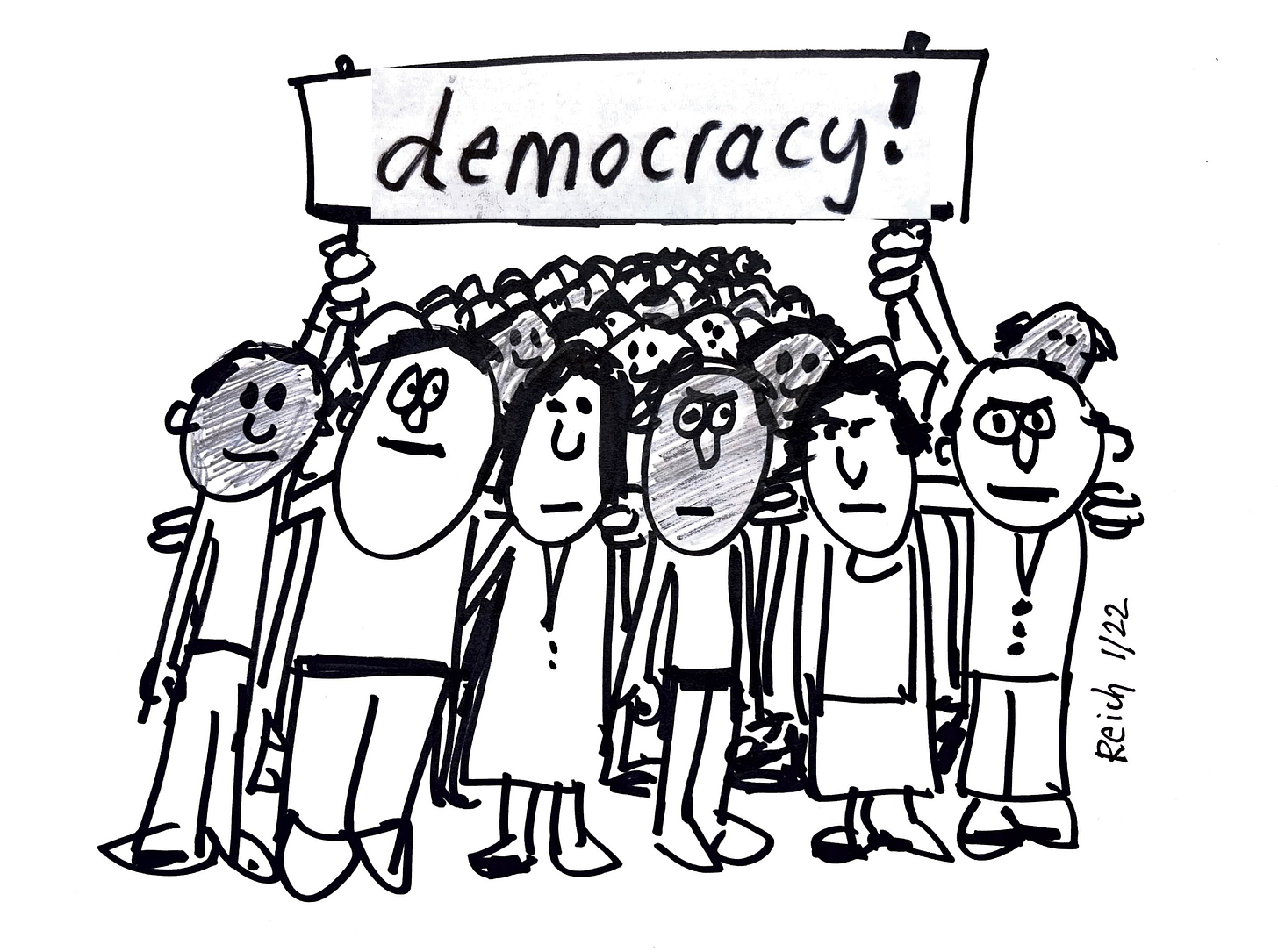In light of last week’s devastating senate vote on voting rights, I keep hearing “voting rights are dead.” Wrong. If voting rights are dead, American democracy is dead. And if American democracy is dead, the entire project that began (imperfectly, to be sure) in 1776 and has been a beacon for the world, is dead. I will not accept that. Nor, I assume, will you.
But what can and should be done now? I’ll get to that in a moment. First, though, it’s important to acknowledge that our two major parties are now irredeemably opposed on this core issue. Democrats are the party of democracy. Republicans — who should have been willing to at least engage in last week’s debate — are not, and should not be allowed to pretend otherwise.
There are two glaring exceptions. Kyrsten Sinema is now the most prominent anti-democracy Democrat; Liz Cheney, the most prominent pro-democracy Republican. On Saturday, the Arizona Democratic Party executive committee appropriately censured Sinema for her vote last week in opposition to changing filibuster rules to pass voting rights bills. The censure has no practical effect but delivers a strong message of condemnation and reflects the will of the party's most active and loyal members. That same day, the Wyoming Republican State Central committee held a straw poll of party activists in which Harriet Hageman, the Trump-endorsed challenger to Liz Cheney, won by a substantial margin. (The secret ballot awarded Hageman 59 votes and Cheney six.) Here again, no practical effect but a strong message. The vote comes eight months before Wyoming’s GOP primary.
The two positions — for and against democracy — are not morally equivalent, of course. Democracy is this nation’s core moral principle.
Every American who cares about this core moral principle must recommit to the task of protecting it from the growing forces seeking to destroy it. This means fighting voter suppression and election subversion with whatever tools are at hand. How?
1. Keep pressure on the 50 Republicans and two Democrats who blocked Senate action. Sinema and Manchin should face pro-democracy primary challengers when both are up for reelection in 2024 (which means organizing should start soon). Every Republican senator should be held accountable as well. If you live in one of their states, make sure you attend town meetings to voice your outrage, and organize voters against their reelection.
2. The Justice Department should announce that it will use every tool in its legal arsenal – including the Civil Rights Act of 1964 and the Fourteenth Amendment to the Constitution -- to enforce equal voting rights. The Voting Rights Act is not the only weapon to protect the right to vote. Congress should increase funding for the Justice Department’s civil rights division and its related work in this.
3. Democrats in Congress must seek to pass whatever pieces of the Freedom to Vote and John Lewis Voting Rights Advancement Act they can. (Importantly, the Senate can avoid the filibuster through the use of the reconciliation process on any issue that touches on funding for easier voting access.)
4. Reforming the 1887 Electoral Count Act is no substitute for voting rights, but it’s still necessary to block states from politicizing election boards and to strengthen federal penalties against intimidating voters and election officials.
5. Biden should fully implement his March executive order calling on all agencies of the federal government to help citizens register and vote.
6. By executive order, Biden should also make Election Day a federal holiday for government employees, and also encourage states to declare Election Day a holiday.
7. If you live in a state with a Republican legislature, you need to do everything possible to block further voter suppression and subversion. Organize and mobilize others. Where applicable, use your state’s referendum process to undo some of the damage.
8. Fighting voter suppression in this fall’s midterm election calls for a voting registration drive this coming summer analogous to the 1964 Freedom Summer in Mississippi (which I’ve recently written about). It should focus on Georgia, Florida, Arizona, Texas, Wisconsin, and North Carolina. All have important races coming up. Now as in 1964, young people could play a key role.
9. We must keep the pressure on the Justice Department to indict Donald Trump and his co-conspirators for their roles in the January 6 attack on the Capitol and in attempting to sabotage the 2020 election. (This would include recent revelations about false slates of electors in seven swing states and an executive order prepared for Trump that would have directed the secretary of Defense to seize voting machines.)
10. Finally, we should support the work of the House’s January 6 committee. Which brings me back to Liz Cheney. Her role as vice-chair of the House January 6 committee is critical to demonstrating the non-partisan legitimacy of that inquiry. I have never agreed with her policy choices on specific issues; her overall voting record has been far to the right. But on the crucial overriding issue of protecting our democracy, she is a hero – and deserves our abiding thanks and support.
Other ideas?














Share this post